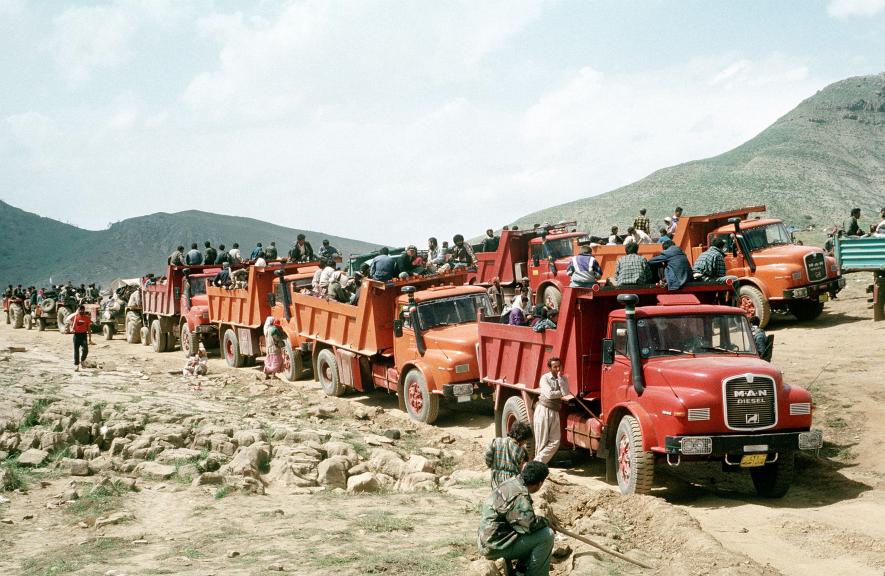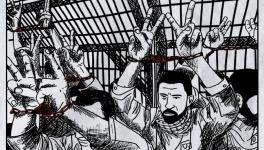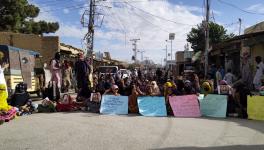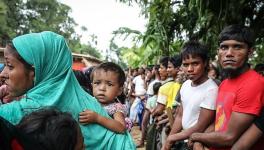The Story of Refugees Beyond Just the Numbers

Image Courtesy: Wikipedia
With India perhaps on the threshold of enacting its first legislation on refugees, lawyer, activist and writer Nandita Haksar has written ‘Forgotten Refugees: Two Iraqi Brothers in India’, narrating the story of India from the point of view of refugees here. “My book is a mirror into our country,” Haksar said on Friday at the pre-release function for the book. “The refugee problem links us to the whole world. How we treat refugees also has a bearing on how we treat our own people,” she said.
In the book, two brothers nick-named Babil and Akkad arrive in India with few—but reassuring—perceptions about India. Their impression often came at loggerheads with reality. “We are a tolerant country, and we have accepted many refugees, but the more intolerant India gets, the more racism, caste [discrimination] and other problems will grow,” Haksar said at the event.
During their time in Goa last year, where they told Haksar their story, the brothers discovered to their surprise and joy that, as children, they had read the Panchatantra stories—animal fables written in Sanskrit that date to ancient India—believing them to be stories originally penned in the Arabic language. But just as the invisible connections between Iraq and India surfaced while writing their story, so did the divisive politics pushing India towards a different future. The brothers saw the protests against the divisive Citizenship Amendment Act, 2019, often found it tough to secure work, and struggled to find a place to live due to hostility towards them as refugees who are Muslims and from a troubled part of the world.
Babil and Akkad also got to meet other refugees in Delhi and other cities, some who had fled persecution worse than theirs’, others who found it far more challenging to stay in India than them. They began to understand how caste often influences how some Indians relate to refugees—and that racism towards African refugees reflects caste hierarchies. They realised that being fair-skinned is an advantage and learned that many Indians do not share meals from the same plate due to the influence of the caste system. Haksar worries that these unsavoury aspects of India, which became part of the two brothers’ cultural and social education, might end up reflected in any new law India frames on refugees.
In particular, Haksar sees her book as an effort to remind Indians of their old ties with the Middle East, especially Iraq. The brothers represent the time before and after Arab nationalism and Islam came to be demonised. “These brothers survived the upheavals in their country and the world, and still they represent the era when India had not lost its connection with the Arab world,” she said.
According to Haksar, the poorer countries are made to bear the burden of the refugee crisis created by powerful Western nations’ unjust wars, especially in the Middle East. Wars and sanctions have bruised the age-old relations between India and large parts of the world. That is why, she believes, India must have a law on refugees. At present, India has no such law, though informally, it has accepted numerous groups of refugees, mostly from South Asian countries. “With no formal legal framework, each set of refugees is treated differently—Tibetans, Sri Lankan Tamils, Rohingyas, and so on,” she said.
India may accept refugees, but legally they are seen as foreigners who may or may not have valid travel, work and/or residency documents. In other words, a refugee is no different from another foreigner, liable to get deported if their papers to stay in India expire, are invalid, or incomplete.
To Haksar, it is “a scandal” that India has been deporting even some refugees whom the UNHCR has recognised as a refugee. International law has a fundamental principle of non-refoulment. A country cannot return asylum-seekers to where they would face persecution. She has fought for several refugees whom India sought to deport using the constitutional guarantees of Articles 14 and 21 that prohibit arbitrary procedures under the rubric of the right to equality and life. Although India is not a party to the 1951 United Nations Convention on Refugees, these guarantees apply to all in India.
The author is concerned that global political currents would influence any Indian law on refugees, and her narration of the story of the brothers from Iraq is an effort to inform rights activists, lawyers, policy-makers, and the public why any new law should not be discriminatory. “Those who are progressive, and believe in equal rights, oppose laws that promote discrimination and exclusion. It is better our discussion on any future law for refugees begins now rather than later, once it is written in stone,” she said.
Her book is also the story of how the UNHCR (United Nations High Commissioner for Refugees) is failing to do the task it is entrusted with, although it remains indispensable to the task. The book is due for a formal release early in April.
Get the latest reports & analysis with people's perspective on Protests, movements & deep analytical videos, discussions of the current affairs in your Telegram app. Subscribe to NewsClick's Telegram channel & get Real-Time updates on stories, as they get published on our website.
























